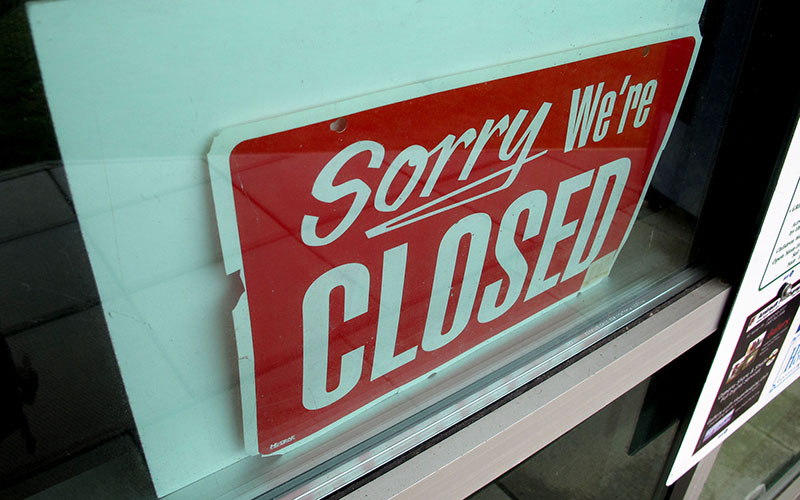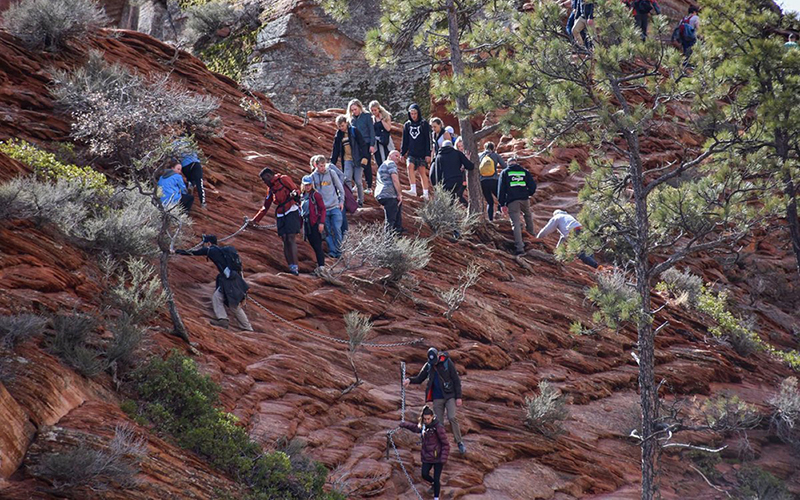
A “stay home” order went into effect Tuesday night across Arizona, looking to stop the coronavirus spread by reducing social interactions. Some defend Gov. Doug Ducey’s order while critics say it does not go far enough. (Photo by Chris Campbell/Creative Commons)
TEMPE – Gov. Doug Ducey’s “stay home” order had not even taken effect before critics were arguing Tuesday over whether it is enforceable and if it goes far enough to protect Arizona from the spread of coronavirus.
The directive, which took effect at 5 p.m. Tuesday, says state residents “shall limit their time away” from home, but it also includes a number of exemptions, and does not specifically list penalties for violating the policy.
Mayors across the state welcomed the statewide action, but repeated their call Tuesday for tighter restrictions on “essential businesses” that cannot be closed during an emergency, after Ducey last week declared golf courses, salons and laundries essential services.
But Attorney General Mark Brnovich sided with Ducey against the mayors late Tuesday.
In an opinion released just hours before the stay-home order was to take effect, Brnovich said city and county governments are free to enforce their own emergency declarations “as long as they are consistent with orders, rules and regulations promulgated by the governor.”
Requests for comment from Brnovich’s and Ducey’s offices were not immediately returned Tuesday.
But Superior Mayor Mila Besich said Tuesday that Ducey’s order has “a lot of enforcement issues that really makes things very difficult,” saying her city’s biggest issue is that it does not have the manpower to fully manage and enforce the stay-at-home order.
“Our rural communities are being hit hardest because people are still going out and they’re hiking and they’re taking part in outdoor activities,” Besich said. “I really wish the governor would have put a few more restrictions on there and revamped that.”
Other states have issued more harshly worded “stay at home” orders that spell out specific penalties, and the Navajo Nation this week imposed a nightly 8 p.m. to 5 a.m. curfew on its residents in efforts to cut down on the spread of coronavirus.
Ducey, by contrast, issued what he called a “Stay home, Stay healthy, Stay Connected policy” that encourages “social connectedness” while promoting “physical distancing.”
It directed people to “limit their time away” from home, but encouraged them to maintain ties online, and get out and exercise while maintaining appropriate separation. It allows people to be out for essential services like medical care or shopping for food or medicine, among several pages of exemptions.
Supporters said that while Arizona’s order does not have the edge of some other states, there are penalties and it is appropriate for the situation in Arizona.
Dr. Jeff Singer, a Phoenix physician and a senior fellow at the Cato Institute, said demographics, age distributions and population are all factors when governors choose their orders which is why Ducey’s order isn’t “unreasonable.”
“I don’t think it’s really fair to say that because they’re doing something that is appropriate in California or New York or Louisiana, that means that it needs to be implemented in every other state,” Singer said.
Ducey’s order spells out that before any action is taken against someone violating the rules, the “person shall be notified and given an opportunity to comply.” Craig Logsdon, a partner at the law firm of Snell and Wilmer, said that gives police a chance to let people to fix their behavior before a citation is issued.
“If someone goes out and it’s not to conduct one of the essential activities or functions of businesses, then they could be in violation of the order,” Logsdon said.
Maryland Gov. Larry Hogan, the current chairman of the National Governors Association, said in a statement Tuesday that “we’re all taking different steps based on what we think is right for our states.” Maryland joined Virginia and the District of Columbia Monday in issuing stay-at-home orders that have potential penalties as high as $5,000 in fines and three months in jail.
But just as governors said they should be free to make decisions that are best for their states, mayors said they should be allowed to impose restrictions that best fit their cities without facing restrictions from the state.
“The governor has greatly hampered our ability to be responsive to the needs of constituents,” Phoenix Mayor Kate Gallego said in a statement Tuesday.
“Mayors from across the state have asked the governor to tailor his list of ‘essential’ services to better reflect the true needs of our community during a crisis,” she said, adding that beauty salons and golf courses should not be on an essential businesses list.
But Singer said that while salons and other “essential” businesses remain open, “people are actually very carefully practicing their own social distancing without being forced to.” He said that while there is criticism of the order, it is subject to change.
“It seems like the governor is willing to change his order as developments change, and that’s the way you need to be when dealing with a disease,” Singer said. “We’re still learning about it ourselves…so as information changes, then the policy changes.”
Besich said she’s trying to take the long view.
“I know we’re going to make a comeback at some point,” she said. “We’re all going through some unprecedented times.”



